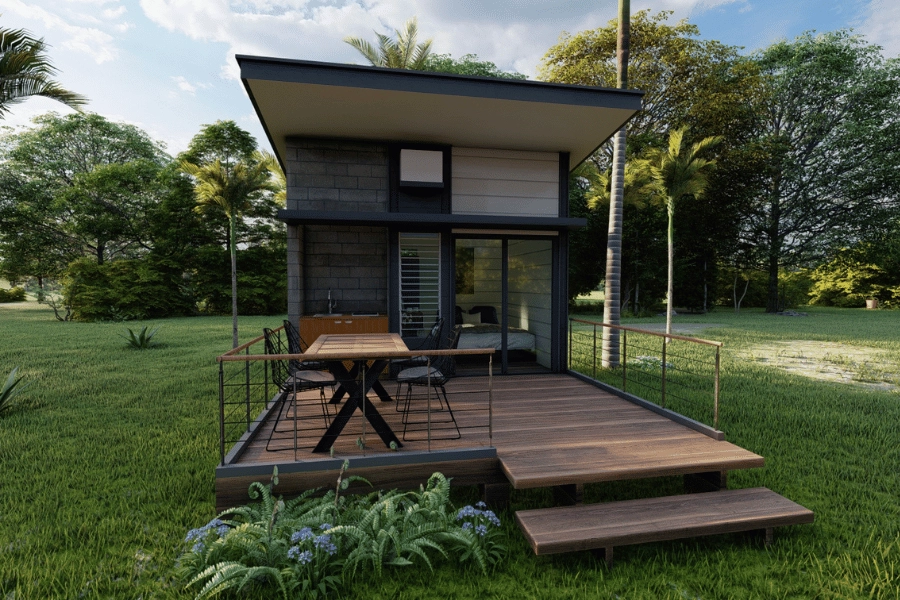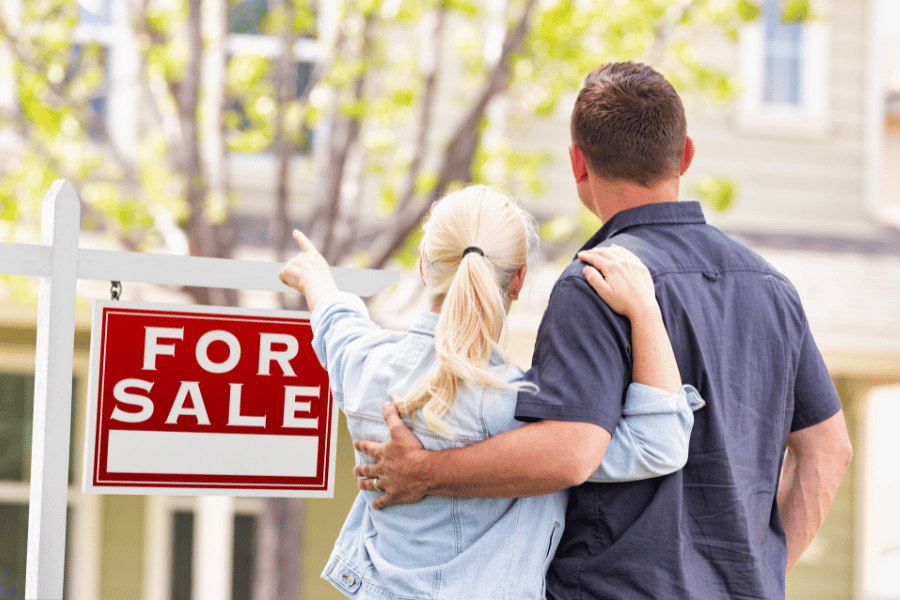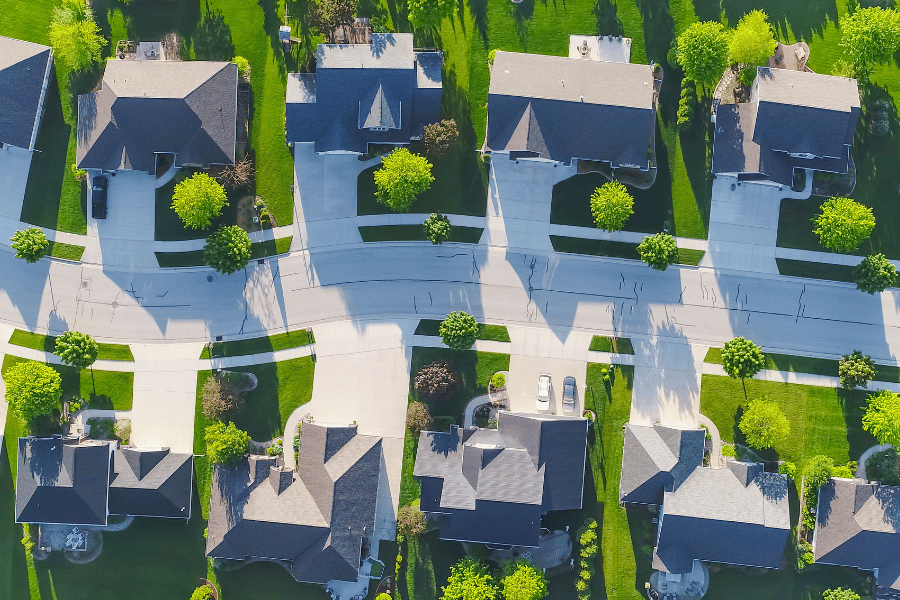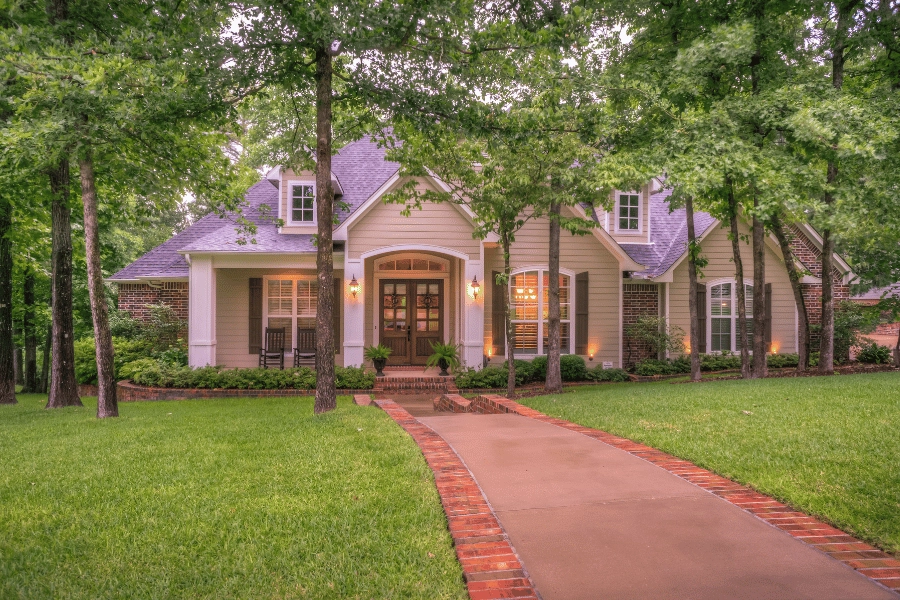Tiny Home Pricing
Are you wondering how much it costs to build or buy a tiny house? Here is what you need to know about tiny homes!
Tiny homes are a unique, conscious-living lifestyle that provides lasting benefits and is a less expensive option to build and maintain while yielding a reduced environmental impact.
Typically between 100 and 400 square feet, tiny homes can be built on mobile platforms or permanent house foundations. Some even have lawns where you could put extra effort into the curb appeal.
The housing market has fundamentally shifted over the past decade. Median home prices in Raleigh have climbed steadily, putting traditional homeownership out of reach for many.
The tiny home movement is not just about living small; it is about living smartly. What started as a niche trend has evolved into a practical solution for first-time homebuyers seeking an entry point to real estate ownership.
Many people assume that because a tiny home is smaller, it must be proportionally cheaper. In reality, the economics are more complex. The truth is, tiny homes come with their own unique costs that differ from traditional real estate.
If you are considering joining the tiny living movement in North Carolina, one question likely dominates your mind: how much will it actually cost? Whether you're drawn to the minimalist lifestyle, looking to reduce your housing expenses, or seeking financial freedom, understanding tiny home pricing is essential before making your decision.
This comprehensive guide walks you through every financial aspect of tiny home ownership, from initial purchase and construction costs to long-term expenses like insurance, taxes, and maintenance.
Keep reading to learn more about pricing a tiny house.
1. What is a Tiny Home?
Before diving into pricing, let's define what we are talking about. A tiny home is typically any residential dwelling under 400 square feet, though most fall in the 200-to-400-square-foot range.
These are not studio apartments. They are full homes with living spaces, kitchens, bathrooms, and bedrooms (often with lofts to maximize square footage). What sets tiny homes apart is that they offer complete independence and the same amenities as traditional homes, just on a much smaller scale.
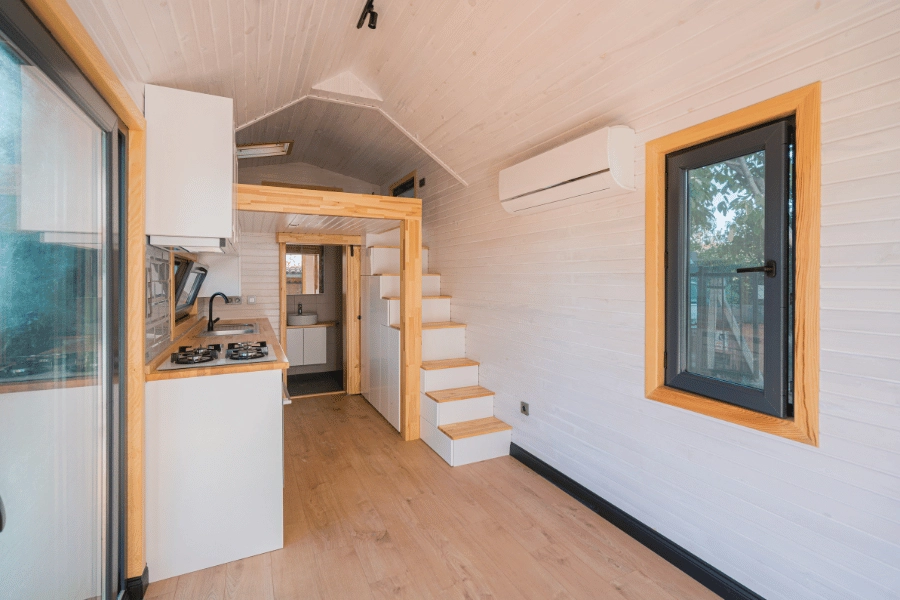
2. Buying vs. Building Cost Comparison
When it comes to tiny homes, you have two main paths: purchasing a pre-built home or building one yourself. The average cost of a tiny home is $52,000, but the real cost will depend on the materials and amenities you choose.
Tiny homes cost $300 per square foot, while traditional homes cost $150 per square foot. However, the limited size of tiny homes, restricted to 500 square feet, makes them still less expensive to build.
The average price of a tiny home presents significant savings when compared to the average US home sales price. It is also important to point out that building a tiny house is generally more cost-effective than purchasing a prebuilt one.
Therefore, if you are in search of a less expensive home that allows you to save money and experience all the benefits of homeownership, considering tiny homes may be a viable option.
| Size | Prebuilt Tiny Home Cost | Built Tiny Home Cost |
| Small (90-250 Sq. Ft.) | $15,000-$50,000 | $30,000-$70,000 |
| Medium (250-300 Sq. Ft.) | $30,000-$80,000 | $50,000-$125,000 |
| Large (300-400 Sq. Ft.) | $45,000-$100,000 | $80,000-$125,000 |
| XL (400-600 Sq. Ft.) | $70,000-$125,000 | $100,000-$200,000+ |
Sourced from Homeguide.
Average Pre-Built Tiny Home Costs
If you're looking to move quickly without the hassle of construction, a pre-built tiny home typically ranges from $30,000 to $100,000, with many in the mid-range offering quality construction and standard features.
The advantage of buying pre-built? You can typically move in within 30 days, avoiding the four to six-month timeline required for custom construction. You also receive a home that's been built to code and comes with compliance documentation.
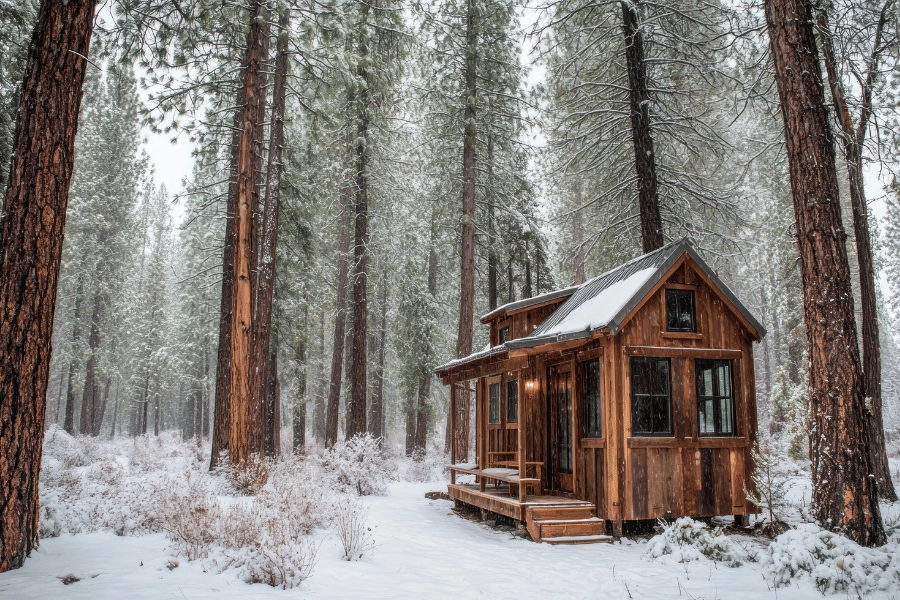
Average Custom Built Tiny Home Costs
Building a tiny home from the ground up offers more control but requires patience and coordination. Custom builds generally cost between $30,000 and $150,000 for construction alone, though high-end custom designs with luxury finishes can exceed $200,000.
By building yourself, you eliminate builder overhead and profit margins; however, building a tiny home can take longer, and there is always the risk of costly mistakes. Hiring professionals for specialized work, such as electrical, plumbing, and structural elements, is always a good idea.
3. Breaking Down the Build Costs
When constructing a house, there are numerous additional expenses that need to be considered, such as laying the foundation, the cost of materials, labor, permits, and so on. It is essential to factor in these expenses when budgeting in order to have an accurate estimate of the total cost.
Understanding where your money goes is critical for budgeting. Here's a detailed breakdown of what contributes to the total cost of building a tiny home:
Materials
Materials represent the largest portion of your building costs and include lumber, flooring, roofing, siding, countertops, insulation, windows, doors, and fixtures. The quality of materials you select directly impacts both the initial cost and long-term durability of your home.
Choosing mid-range materials offers a good balance between affordability and longevity, while premium materials can quickly escalate costs but may reduce future maintenance expenses.
While the building materials have similar costs as traditional home materials, the smaller size of tiny homes means that the average price will be lower than the average conventional home. Tiny homeowners will pay the same per square foot but will purchase only a fraction of the materials needed compared to a traditional home.
Foundation
The foundation type significantly impacts your total investment. Whether you are building on a concrete slab, piers, or a full foundation, this is a non-negotiable expense for stationary homes.
Foundations are critical for property appreciation, weather protection, moisture prevention, and insurance purposes. Your local building codes will dictate which foundation type is required in your area.
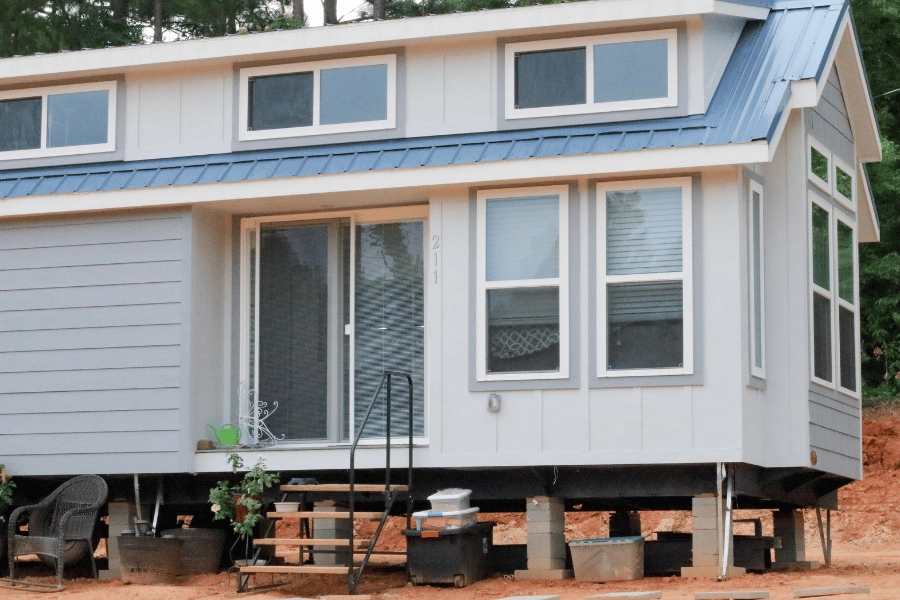
Labor Costs
Professional labor typically accounts for 15-45% of your total project cost, depending on your location and the complexity of the build. Rural areas often have lower labor rates than urban centers like Raleigh.
If you choose to DIY parts of the project, you can reduce these costs, though professional help is still recommended for electrical, plumbing, and structural work to ensure safety and code compliance.
Permits and Inspections
Do not overlook permitting costs, which vary by locality but typically range from several hundred to a few thousand dollars. These permits ensure your tiny home meets local building codes and zoning regulations.
Inspection fees may be separate from permit costs. For Raleigh and the surrounding Wake County areas, it's essential to check with your local building department about tiny home regulations, as some municipalities have specific requirements for ADU (Accessory Dwelling Unit) status.
Additional Costs
Beyond the primary categories, factor in:
- Land surveys ($625 average)
- Utility hookups (varies by location)
- Grading and site preparation
- Inspections (beyond permits)
- Builder overhead and profit margins (if hiring professionals)
4. Mortgage, Insurance, and Taxes
Traditional lenders do not typically make mortgages on tiny homes. However, it is still advisable to check with different lenders as their policies may vary. In most cases, buyers usually seek personal loans from banks to begin building their tiny homes.
Understanding financing options is critical, as traditional mortgages rarely apply to tiny homes. Most mortgage lenders have minimum loan amounts ($50,000 to $100,000), and many require homes to meet specific square footage thresholds. Many tiny homes fall below these thresholds, making conventional mortgages unavailable.
It is important to note that a tiny home is still an investment that should be insured. Insuring a tiny home presents unique challenges. Traditional homeowners' insurance policies often don't cover tiny homes, particularly those on wheels. Insurance companies may view tiny homes as higher-risk investments or see them as RVs rather than permanent residences.
Budgeting and saving money is the best way to buy or build a tiny home. While this option may be less attractive to some people, it is the most affordable and beneficial option when downsizing or saving money.
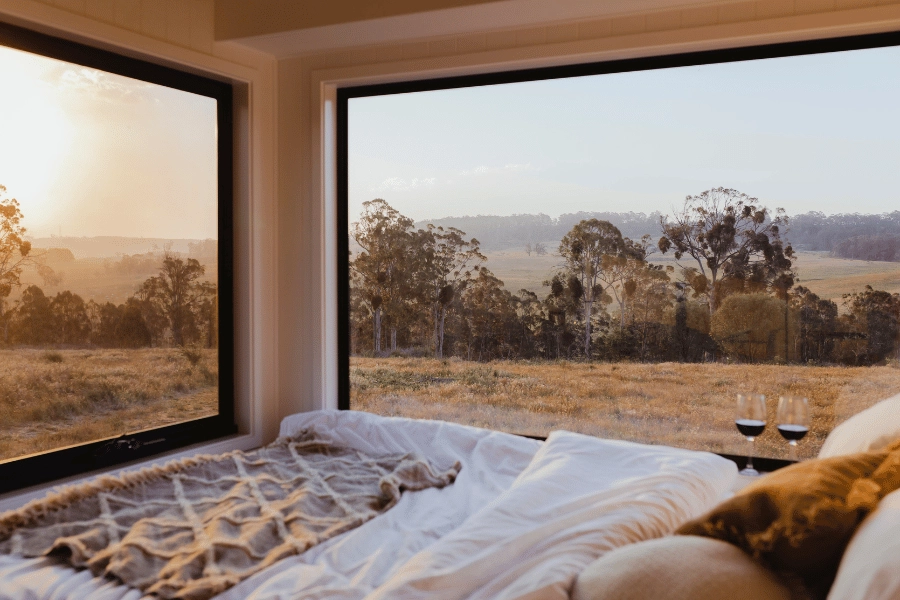
5. Benefits of a Tiny House
Despite higher per-square-foot costs, tiny homes offer compelling financial advantages that explain why 73% of Americans would consider tiny living:
By owning a smaller home, you can save money on decorations, furniture, utilities, and overall construction. Along with affordability, another reason people love tiny houses is the mobility they offer.
Being able to pull your home anywhere you want is something many people enjoy. This option is charming for those who wish to travel and change their scenery.
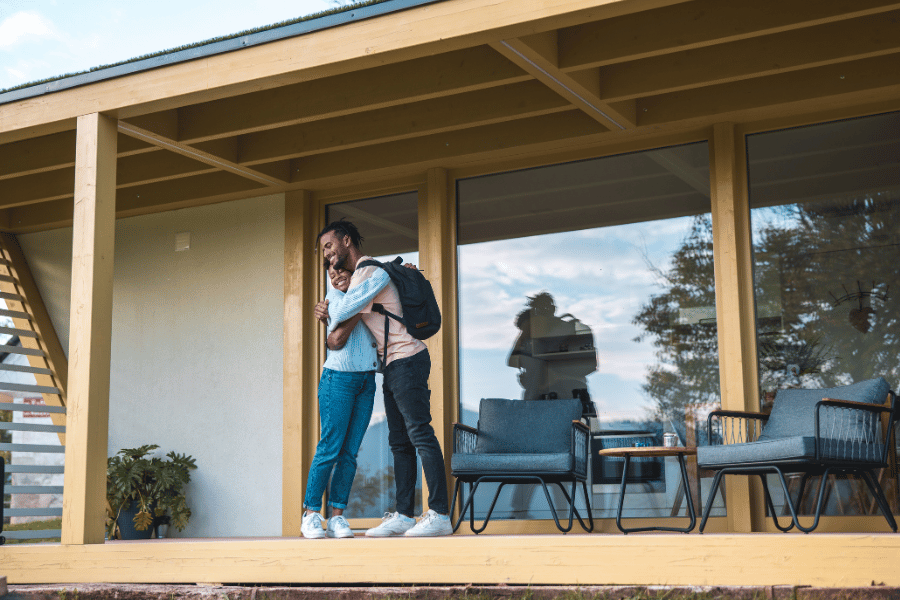
Tiny homes are also eco-friendly and sustainable for the environment. Because of their smaller space, tiny homes require less energy and materials to build. There are many reasons why this type of home can be more environmentally friendly than a traditional home.
Lower Overall Housing Costs: A $50,000 tiny home costs dramatically less than the median U.S. home price of nearly $400,000. For first-time homebuyers and those with limited budgets, this difference is transformative.
Simplified Living: The minimalist lifestyle inherent to tiny homes often leads to reduced consumption and lower overall spending. You buy less, own less, and waste less.
Path to Homeownership: For many, especially younger generations, tiny homes represent an achievable path to owning real estate. In a housing market where traditional homes are financially out of reach, tiny homes make homeownership easier.
Sustainability and Lower Operating Costs: Reduced energy consumption translates to lower monthly expenses. Many tiny home dwellers adopt renewable energy solutions like solar panels, further reducing long-term costs.
Freedom and Flexibility: Mobile tiny homes offer genuine lifestyle flexibility. You can relocate without selling, explore different communities, or downsize when life circumstances change.
Methodology
Data was sourced from CNBC and Home Guide to determine the costs of a tiny home.
FAQS
What is the average cost of a tiny home in the United States?
A tiny home typically costs between $30,000 and $60,000, with the national average at $52,000. However, the cost may vary depending on factors such as size, type, foundation, and materials.
What is a reasonable budget for a tiny house?
Tiny homes can cost as little as $8,000 or as much as $150,000, depending on the amenities and materials used. However, building a tiny home can be more cost-effective than buying a pre-built one.
Do tiny homes actually save money?
Tiny homes are an economical choice that can help you save a lot of money. According to statistics, 58 percent of tiny homeowners have been able to save more money ever since they bought their tiny homes.
How long do tiny homes last?
Tiny homes can last between 30 to 50 years with careful maintenance. However, it's essential to consider the materials and construction methods used when deciding to get a tiny home.
A tiny house without a base will break down faster, so make sure to consider this. By choosing sturdy materials and a strong foundation, you can ensure that your tiny home will last for many years to come.

Pricing a Tiny House - The Bottom Line
Many people are opting for tiny homes as they offer a variety of benefits. However, it's important to note that this living option may not be suitable for everyone and depends on your lifestyle, needs, and budget.
Tiny homes provide a unique, environmentally conscious lifestyle with reduced impact, as well as being a cost-effective option to build and maintain. The trend of downsizing living space has made tiny homes more popular than ever, appealing to those seeking financial freedom or flexibility in location.
As you evaluate tiny homes, keep several factors top-of-mind: your long-term lifestyle goals, your financial flexibility, and your willingness to embrace minimalism.
If you are considering a move to Raleigh and the surrounding area, contact the experts at Raleigh Realty. Your dream of affordable homeownership is more achievable than you might think.
